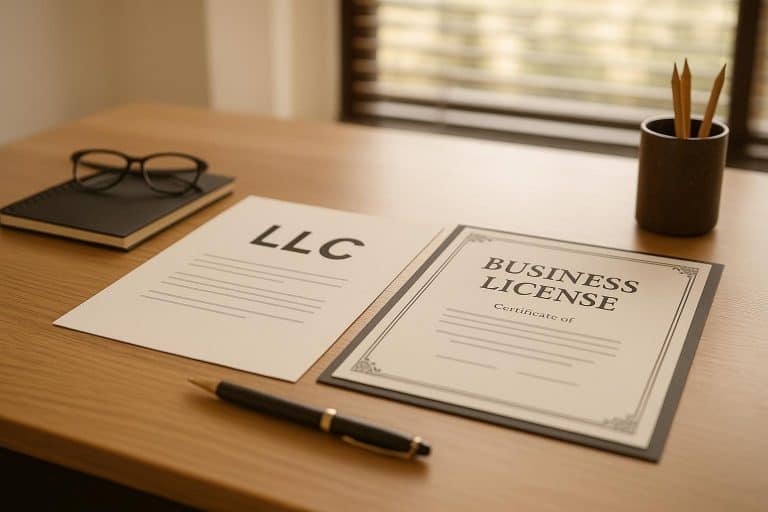Starting a business as a digital nomad or remote entrepreneur can feel overwhelming, especially when navigating the complex world of business structures and legal requirements. If you’ve ever wondered whether a Limited Liability Company (LLC) is the right choice for your location-independent business, you’re not alone. This comprehensive guide will walk you through everything you need to know about LLCs, from their fascinating history to their modern applications for digital entrepreneurs.
What is an LLC? Understanding the Limited Liability Company Structure
The Limited Liability Company, commonly abbreviated as LLC, represents one of the most popular and versatile business structures available to entrepreneurs today. An LLC is a hybrid business entity that strategically combines the best features of corporations and partnerships while eliminating many of their drawbacks.
Core Characteristics of an LLC
An LLC serves as a legal entity that’s separate from its owners (called “members”), providing crucial protection for personal assets while maintaining operational flexibility. This business structure offers:
- Limited liability protection for all members
- Pass-through taxation that avoids double taxation
- Flexible management structure without rigid corporate formalities
- Credibility enhancement for business dealings
- Estate planning benefits for asset protection
The beauty of an LLC lies in its simplicity and adaptability. Unlike corporations that require extensive paperwork, board meetings, and strict corporate governance, LLCs can be managed with minimal formalities while still providing robust legal protection.
The History of LLCs: From Wyoming Innovation to Worldwide Adoption
The Birth of the LLC in Wyoming (1977)
The first LLC was established in Wyoming in 1977, marking a revolutionary moment in American business law. This groundbreaking legislation was designed to attract foreign investment, particularly from German and Latin American companies that were familiar with similar hybrid structures in their home countries.
Wyoming’s forward-thinking approach to business formation has made it a preferred destination for entrepreneurs seeking favorable business climates. The state’s pro-business legislation continues to attract digital nomads and location-independent professionals who value privacy, low costs, and minimal regulatory burden.
National Expansion and Modern Evolution
Following Wyoming’s lead, all 50 states gradually adopted LLC legislation throughout the 1980s and 1990s. Today, Delaware has become particularly business-friendly, with many large corporations choosing to incorporate there due to its well-established legal precedents and business-friendly court system.
The evolution of LLC law has been particularly beneficial for digital entrepreneurs and remote workers who need flexible business structures that can adapt to changing locations and business models.
Why LLCs Are Perfect for Digital Nomads and Remote Entrepreneurs
1. Location Independence and Flexibility
For digital nomads, the LLC structure offers unparalleled flexibility. Unlike traditional corporations that may require physical presence for meetings and governance, LLCs can be managed entirely remotely. This makes them ideal for:
- Remote business operations across multiple jurisdictions
- International tax planning for location-independent income
- Flexible profit distribution among global team members
- Simplified compliance requirements compared to corporations
2. Asset Protection for Global Assets
Digital entrepreneurs often accumulate assets across multiple countries and jurisdictions. An LLC provides a protective barrier between personal assets and business liabilities, which is particularly important when operating in unfamiliar legal environments.
3. Professional Credibility
Operating as an LLC immediately enhances your professional credibility with clients, vendors, and financial institutions. This is especially valuable for freelancers and consultants who want to establish trust in international markets.
Comprehensive Benefits of Forming an LLC
Limited Liability Protection: Your Personal Financial Shield
The primary advantage of an LLC is the limited liability protection it provides to its members. This means that your personal assets—including your home, personal bank accounts, and investments—are generally protected from business debts and liabilities.
What Limited Liability Covers:
- Business debts and financial obligations
- Lawsuits against the business
- Professional liability claims
- Contract disputes and breaches
- Employee-related claims and workers’ compensation
Important Limitations:
Limited liability protection has boundaries. Personal liability may still apply in cases of:
- Personal guarantees on business loans
- Fraudulent or illegal activities
- Failure to maintain proper LLC formalities
- Commingling personal and business assets
Pass-Through Taxation: Avoiding Double Taxation
One of the most significant financial benefits of an LLC is its pass-through taxation structure. Unlike corporations, which face double taxation (once at the corporate level and again when profits are distributed to shareholders), LLCs pass profits and losses directly to their members.
How Pass-Through Taxation Works:
- Business profits are not taxed at the entity level
- Income and losses flow through to members’ personal tax returns
- Self-employment taxes may apply to active members
- Tax elections can be made for different treatment (S-Corp election)
Flexible Management Structure
LLCs offer unprecedented flexibility in management structure, making them ideal for diverse business models and ownership arrangements.
Management Options:
- Member-managed LLCs: All members participate in daily operations
- Manager-managed LLCs: Designated managers handle operations
- Flexible voting rights: Not tied to ownership percentages
- Customizable profit distributions: Based on operating agreement terms
Credibility and Professional Image
Operating as an LLC immediately enhances your business’s professional credibility. This is particularly valuable for:
- Client acquisition and relationship building
- Banking relationships and credit applications
- Vendor negotiations and trade credit
- Partnership opportunities with other businesses
Step-by-Step Guide to Forming an LLC
Step 1: Choose Your State of Formation
Selecting the right state for your LLC formation is crucial for digital nomads and remote entrepreneurs. Consider these factors:
Top States for Digital Nomads:
- Wyoming: No state income tax, strong privacy protection, low fees
- Delaware: Business-friendly courts, established legal precedents
- Nevada: No state income tax, asset protection benefits
- Florida: No state income tax, favorable business climate
Step 2: Select Your LLC Name
Your LLC name must be unique and comply with state requirements. Most states require names to include “LLC” or “Limited Liability Company.”
Name Requirements:
- Must be distinguishable from existing business names
- Cannot contain restricted words without proper licensing
- Should be available as a domain name for online presence
- Consider trademark implications for future expansion
Step 3: Appoint a Registered Agent
Every LLC must have a registered agent—a person or company designated to receive legal documents and official correspondence on behalf of the LLC.
Registered Agent Options:
- Yourself (if you have a permanent address in the state)
- Professional registered agent service (recommended for nomads)
- Attorney or accountant in the state of formation
Step 4: File Articles of Organization
The Articles of Organization is the foundational document that officially creates your LLC. This document typically includes:
- LLC name and purpose
- Registered agent information
- Management structure
- Member information (if required)
- Duration of the LLC
Step 5: Create an Operating Agreement
While not always legally required, an operating agreement is essential for defining how your LLC will operate. This document should cover:
Essential Operating Agreement Provisions:
- Member rights and responsibilities
- Profit and loss distribution
- Management structure and voting rights
- Transfer of membership interests
- Dissolution procedures
Step 6: Obtain Necessary Licenses and Permits
Depending on your business type and location, you may need various licenses and permits. Research requirements for:
- Business licenses
- Professional licenses
- Industry-specific permits
- International business registrations
Step 7: Get an EIN (Employer Identification Number)
An EIN is required for tax purposes and to open business bank accounts. You can obtain an EIN directly from the IRS website.
LLC vs. Other Business Structures: Making the Right Choice
LLC vs. Sole Proprietorship
For many freelancers and consultants, the choice between an LLC and sole proprietorship is fundamental:
LLC Advantages:
- Limited liability protection
- Professional credibility
- Tax flexibility
- Business banking separation
Sole Proprietorship Advantages:
- Lower initial costs
- Simpler tax filing
- Complete control
- Minimal formalities
LLC vs. Corporation
The choice between an LLC and corporation depends on your growth plans and operational needs:
LLC Advantages:
- Pass-through taxation
- Management flexibility
- Fewer formalities
- Easier profit distribution
Corporation Advantages:
- Easier to raise capital
- Stock options for employees
- Perpetual existence
- Established legal precedents
Special Considerations for Digital Nomads
International Tax Implications
Digital nomads must navigate complex international tax obligations. Key considerations include:
Foreign Earned Income Exclusion
US citizens may qualify for the Foreign Earned Income Exclusion, potentially excluding up to $120,000 (2023) of foreign-earned income from US taxation.
Tax Treaties and Double Taxation
Understanding tax treaties between countries can help minimize double taxation and optimize your overall tax burden.
Virtual Office Solutions
For location-independent entrepreneurs, maintaining a professional business address is crucial. Consider virtual office services that provide:
- Professional mailing address
- Mail forwarding services
- Phone answering services
- Meeting room access
Banking and Financial Services
Establishing business banking relationships can be challenging for digital nomads. Consider:
- Online business banking solutions
- Multi-currency accounts
- International wire transfer capabilities
- Digital payment processing
Common LLC Mistakes to Avoid
1. Inadequate Operating Agreement
Many entrepreneurs skip creating a comprehensive operating agreement, leading to disputes and confusion later. Always invest in a well-drafted operating agreement that covers all potential scenarios.
2. Commingling Personal and Business Assets
Mixing personal and business finances can compromise your limited liability protection. Maintain separate bank accounts and clear financial boundaries.
3. Neglecting Annual Requirements
Each state has ongoing requirements for LLCs, including annual reports and fees. Failure to comply can result in dissolution or penalties.
4. Inadequate Record Keeping
Proper documentation is essential for maintaining LLC status and maximizing tax benefits. Implement systems for:
- Financial record keeping
- Meeting minutes and decisions
- Contracts and agreements
- Tax document organization
Advanced LLC Strategies for Entrepreneurs
Multi-Member LLCs for Partnerships
For business partnerships, LLCs offer flexibility in structuring ownership and management rights that corporations cannot match.
Series LLCs for Multiple Ventures
Some states allow Series LLCs, which enable entrepreneurs to create separate “series” within a single LLC, each with its own assets and liabilities.
LLC Tax Elections
LLCs can elect different tax treatments, including:
- S-Corporation election for potential self-employment tax savings
- C-Corporation election for certain business models
- Partnership election for multi-member LLCs
Technology and Legal Compliance Tools
Business Formation Services
Professional business formation services can streamline the LLC creation process, especially for digital nomads who need remote assistance.
Legal Compliance Software
Consider legal compliance software that helps track:
- Annual report deadlines
- Tax filing requirements
- License renewals
- Regulatory changes
Financial Management Tools
Implement financial management systems designed for LLCs:
- Accounting software with LLC features
- Expense tracking applications
- Tax preparation software
- Financial reporting tools
Frequently Asked Questions (FAQs)
What is the difference between an LLC and a corporation?
An LLC provides pass-through taxation and management flexibility, while a corporation offers easier access to capital and stock options but faces double taxation. LLCs are generally simpler to operate and maintain, making them ideal for small businesses and digital nomads.
Can I form an LLC if I’m not a US citizen?
Yes, non-US citizens can form LLCs in the United States. However, there may be additional tax implications and reporting requirements. It’s advisable to consult with a tax professional familiar with international business structures.
How much does it cost to form an LLC?
LLC formation costs vary by state, typically ranging from $50 to $500 in state filing fees. Additional costs may include registered agent services ($100-$300 annually), legal assistance, and ongoing compliance fees.
Do I need an attorney to form an LLC?
While not legally required, consulting with an attorney is recommended, especially for complex business structures or multi-member LLCs. An attorney can help draft operating agreements and ensure compliance with state laws.
Can I change my LLC’s state of formation later?
Yes, you can move your LLC to another state through a process called “domestication” or by forming a new LLC in the desired state and transferring assets. However, this process can be complex and may have tax implications.
What happens to my LLC if I die?
Unlike sole proprietorships, LLCs can continue operating after a member’s death, depending on the operating agreement and state law. Proper estate planning is essential for ensuring smooth business continuation.
Can I operate my LLC from anywhere in the world?
Yes, as a digital nomad, you can operate your LLC from anywhere in the world. However, you must maintain compliance with your state of formation and consider international tax implications.
Conclusion: Your Path to Business Success Starts with an LLC
The Limited Liability Company structure represents one of the most powerful tools available to modern entrepreneurs, particularly those embracing location independence and digital nomadism. By combining the protection of a corporation with the flexibility of a partnership, LLCs offer an ideal foundation for building and scaling your business.
Whether you’re a freelancer looking to establish credibility, a consultant seeking asset protection, or an entrepreneur planning to build a global business empire, an LLC provides the legal framework and operational flexibility you need to succeed.
The journey from superhero to successful entrepreneur begins with making informed decisions about your business structure. By choosing an LLC, you’re not just forming a business entity—you’re creating a foundation for long-term success and financial protection.
Ready to Form Your LLC?
Don’t let complex legal requirements hold you back from pursuing your entrepreneurial dreams. The team at BusinessAnywhere.io specializes in helping digital nomads and remote entrepreneurs navigate the business formation process with confidence and ease.
Take Action Today:
- Register your LLC with our streamlined formation process
- Explore Wyoming LLC formation for maximum privacy and protection
- Learn about business structures to make informed decisions
- Discover the benefits of LLC formation for your specific situation
Your business dreams are waiting. Let’s make them a reality with the right legal foundation.
Ready to start your LLC journey? Contact BusinessAnywhere.io today for personalized guidance and support tailored to digital nomads and location-independent entrepreneurs.








